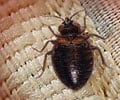Compounds that play an important role in insects to develop from larvae to adults have been found to be effective in preventing and reducing cardiac cell overgrowth and irregular heart rhythms.
Compounds known to play an important role in how insects develop from larvae to adults have been shown in a mouse model for congestive heart failure to be effective in preventing and reducing cardiac cell overgrowth and irregular heart rhythms, according to UC Davis research published in the early online edition of the Proceedings of the National Academy of Sciences.
The research, led by cardiologist and cell biologist Nipavan Chiamvimonvat and entomology professor Bruce Hammock, identifies epoxide hydrolase inhibitors as novel and powerful chemical compounds that block an immune system protein (NF-?B) known to play a role in cardiac cell overgrowth and arrhythmias.The work is important because it identifies a new biochemical target for the development of drugs to treat enlargement of the heart and arrhythmias – conditions that have few treatment options and ultimately progress to heart failure and sudden cardiac death.
”Enlargement of the heart is one of the most common causes of heart failure in the United States,” said Chiamvimonvat. “Once cardiac failure develops, the condition is irreversible and is associated with a very high death rate. Fifty percent of patients whose heart failure has progressed to include shortness of breath without physical activity do not to survive beyond one year. We need a better way to control and prevent enlargement of the heart to improve treatment options for patients and reduce mortality.”
The heart enlarges in response to a variety of internal and external stimuli, including pressure or volume overload; heart attacks leading to loss of muscle mass; mutations of proteins in the heart muscles; and loss of contractile mass from a previous heart attack. Initial enlargement can result in a stronger heart, but continued and sustained heart enlargement is life-threatening.
As the heart becomes enlarged, it also disrupts the electrical signals controlling the heartbeat, causing arrhythmias and increasing the risk of sudden cardiac death. While most patients can be treated with drug therapy, these treatments have side effects and are not effective in all patients. Patients with arrhythmias who are at high-risk for sudden cardiac death, for example, may require implanted defibrillators, which are costly and invasive.
“By blocking the pathway that leads to overgrowth of cardiac cells, we have shown that it is possible to prevent the progressive deterioration of heart function and the development of abnormal heart rhythms.” said Chiamvimonvat, a physician who specializes in cardiac rhythm abnormalities and investigates the cellular and molecular mechanisms leading to arrhythmia.
Advertisement
Over the years Hammock’s lab has isolated thousands of epoxide hydrolase inhibitors, compounds that have cardioprotective effects. Previous studies from UC Davis and other laboratories have shown that epoxide hyrolase inhibitors can reduce high blood pressure, but the collaboration with Chiamvimonvat is the first to investigate a possible effect on congestive heart failure and conditions related to heart enlargement.
Advertisement
SRM











